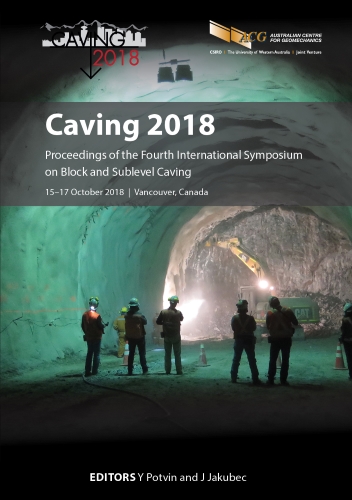An empirical comparison between new and existing laboratory-based dynamic sample configurations

|
Authors: Knox, G; Berghorst, A; de Bruin, P |
DOI https://doi.org/10.36487/ACG_rep/1815_58_Knox
Cite As:
Knox, G, Berghorst, A & de Bruin, P 2018, 'An empirical comparison between new and existing laboratory-based dynamic sample configurations', in Y Potvin & J Jakubec (eds), Caving 2018: Proceedings of the Fourth International Symposium on Block and Sublevel Caving, Australian Centre for Geomechanics, Perth, pp. 747-758, https://doi.org/10.36487/ACG_rep/1815_58_Knox
Abstract:
Laboratory-based dynamic testing allows rockbolt developers to apply impulses of energy to a rockbolt in order to approximate some loading aspects that the rockbolt would experience during a rockburst in an underground mine. This data can be used to compare a rockbolt’s dynamic performance providing geotechnical engineers with useful information for designing their required ground support system. There are two general sample configurations commonly used in this type of dynamic testing – split-tube test and continuous-tube test. This paper summarises a proposed third configuration – a multisplittube test.
Keywords: ground support, laboratory testing, rockburst, dynamic, fractured ground
References:
ASTM International 2008, ASTM D7401-08: Standard Test Methods for Laboratory Determination of Rock Anchor Capacities by Pull and Drop Tests, ASTM International, West Conshocken.
Knox, G & Berghorst, A 2018a, ‘Increased agility for the research and development of dynamic roof support products’, in CC Li, X Li & Z-X Zhang (eds), Proceedings of the Third International Conference on Rock Dynamics and Applications, CRC Press, Boca Raton.
Knox, G & Berghorst, A 2018b, ‘Proposed new multiple split tube testing method for dynamic ground support used in highly fractured ground’, presentation, CIM 2018 Convention, Canadian Institute of Mining, Metallurgy and Petroleum, Westmount.
© Copyright 2026, Australian Centre for Geomechanics (ACG), The University of Western Australia. All rights reserved.
View copyright/legal information
Please direct any queries or error reports to repository-acg@uwa.edu.au
View copyright/legal information
Please direct any queries or error reports to repository-acg@uwa.edu.au
